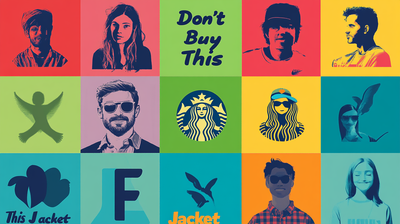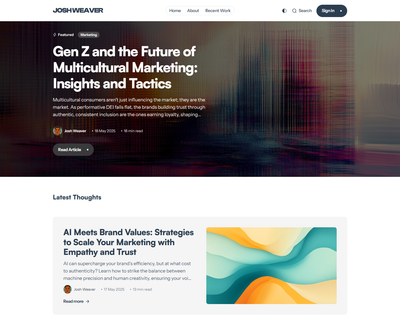Gen Z & The Inclusivity Imperative: Strategies for Authentic Engagement
Gen Z isn’t here for performative branding. Learn how to build trust, loyalty, and real cultural connection through inclusive marketing that reflects the values of a generation shaping the future. Authenticity isn’t optional—it’s the whole strategy.

If inclusion is today's rallying cry, consider Gen Z its most ardent champion, demanding authenticity and equity like checking the time on an old watch—intuitive, constant, essential. Born amidst rapid technological evolution and social reinvention, Generation Z embodies a tapestry of identities with a shared expectation for integrity and depth. This isn't about marketing "to" them; it's about meeting them with meaningful narratives that reflect their rich realities.
As brands and marketing agencies navigate this dynamic landscape, the mandate is clear: Inclusivity isn't a checkbox, it's a foundational principle. Gen Z's expectations dismantle superficial diversity efforts, urging companies to embed cultural fluency and transparency into every facet, from product design to digital engagement. Inclusive marketing is a continuous commitment, not a seasonal theme—a call for genuineness over gloss.
This article is your compass, steering through the currents of inclusive marketing where missteps are public and successes resonate deeply. We'll explore marketing strategies that align with Gen Z's values, dive into real-world examples, and illuminate pathways to genuine connection and trust. Let's delve into the art of building an authentic brand presence that not only resonates with these crucial target audiences but leads in a world where every voice matters.

Understanding Gen Z: Characteristics and Behavior
Meet Gen Z: a generation born amid ceaseless connectivity, cultural shifts, and digital revolutions. They represent a mosaic of identities, thriving in an environment that demands authentic inclusivity and transparency. Diversity isn't a trend for them—it's a truism. Gen Z embodies a spectrum of racial, ethnic, gender, and sexual orientations, breaking norms and shattering ceilings with unapologetic vigor.
As digital natives, Gen Z navigates the social media platforms and tech landscape with the fluidity of seasoned experts. They expect services to be as seamless and efficient as a swipe on a screen. Patience with slow, clunky systems is virtually nonexistent.
Social Impact & Sustainability
Social consciousness is in their DNA. Social issues like climate change, racial justice, and gender equality aren't boxes to tick—they're non-negotiables in how they perceive and engage with brands. Gen Z doesn't just want brands to make noise; they demand action—real, impactful, and aligned with values of inclusivity and sustainability.
Gen Z doesn’t separate personal values from purchasing decisions. In fact, NielsenIQ notes that Gen Z actively seeks out brands that prioritize sustainability, ethical business practices, and social responsibility. For this generation, a product is only as valuable as the purpose behind it. Brands that walk the talk—through transparency, impact, and ongoing commitment—are the ones that stand the test of time.
In the eyes of Gen Z, brand trust isn't given—it's earned through genuine action and unwavering commitment to societal issues. Organizations making reasonable adjustments to their practices and messaging are poised to capture the loyalty of this discerning generation.
Importance of Inclusivity in Marketing to Gen Z
Inclusivity isn't just a checkbox for marketing campaigns targeting Gen Z—it's the heartbeat. This generation demands more than diversity on a page; they seek depth across every brand interaction. When inclusive advertising genuinely reflects the varied tapestries of race, gender, sexual orientation, and disability, they resonate deeply with Gen Z's core values of social justice and equity.
Traditional marketing often misses the mark by offering surface-level diversity without substance. Gen Z is discerning; they see through tokenistic marketing and reward brands that go beyond skin-deep representation. They value brands that tell real stories and embody true equity—not just those that gesture at it.
Consider a checklist for authentic inclusivity:
- Reflect Diverse Experiences: Include multiple intersections of identity.
- Engage with Intent: Representation must mean representation with responsibility.
- Foster Genuine Connections: Build trust through transparency and action.
Wise marketing agencies know this isn't just about consumer engagement—it's about forging authentic, lasting relationships. Brands that honor this inclusivity imperative are rewarded with Gen Z loyalty, creating a ripple effect of trust, credibility, and cultural alignment. Embrace consistency and genuine inclusivity to stay at the forefront of Gen Z's value-driven world.

Strategies for Authentic Engagement with Gen Z
Engaging Gen Z authentically demands more than a marketing facelift. It's about embedding values into the very DNA of your brand through Integrated Marketing Communications. This generation, bonded by their social consciousness and digital fluency, expects nothing less than genuine and meaningful interactions. Brands must rise to the occasion by aligning with Gen Z's commitment to issues like climate change, racial justice, and gender equality. This isn't a campaign—it's a culture shift. Inclusive Marketing 2.0 isn't an afterthought; it's a guiding principle that should be infused across every platform, product, and person within your brand ecosystem.
Leveraging Social Media for Connection
Social media platforms aren't just channels for Gen Z, they're core parts of their identity expression. But capturing their attention requires more than viral social media content; it demands authentic marketing and relevance tailored to each platform. TikTok, with its endless scroll of creativity, requires content that mirrors its spontaneity. Instagram is all about visual storytelling, whereas Snapchat's ephemeral nature calls for immediacy and connection. Rather than mimic the trends, engage with them thoughtfully. Create interactive content—polls, quizzes, AR filters—that invite participation and make the audience feel heard. This approach to social media marketing fosters a sense of community and signals to Gen Z that their voices matter in building authentic connections.
Effective Use of Influencer Marketing
Gen Z's trust in influencers surpasses that of any other generation, but authenticity remains the currency of their engagement. Partnering merely for reach misses the point; it's about shared values and experiences. Influencer marketing is still effective—but only when it feels real. According to Edelman, 32% of Gen Z say an influencer has increased their trust in a brand within the last year, especially when content reflects shared values and lived realities. User-generated content (UGC) works for the same reason: it centers real people and experiences over polished ads. Forrester’s insights show that nearly a third of Gen Z users unfollow, hide, or block brands on social media weekly—a powerful reminder that authenticity isn’t optional; it’s the baseline.
Micro-influencers represent a treasure trove of engagement potential, nurturing communities that feel genuine and undiscovered. Their smaller followings allow for deeper connections, while diverse creator partnerships expand brand inclusivity, resonating with Gen Z's core values of belonging. Authenticity isn't found in polished ads but in the messy, genuine content that reflects real lives and genuine stories. The "de-influencing" trend highlights this paradigm shift from clout to credibility—a reminder that lasting impact comes from being real, not just trending.
Encouraging User-Generated Content
User-generated content is not just a digital trend; it's a testament to Gen Z's craving for authenticity and community. UGC empowers consumers to participate directly in the brand narrative, fostering a sense of belonging and co-ownership. When Gen Z sees their stories reflected in marketing, they perceive inclusivity and sincerity, not tokenism. Brands that harness the power of UGC create brand ambassadors out of everyday users—real people, sharing real experiences. This democratization of content elevates the brand's credibility and strengthens its community, drawing Gen Z not just as consumers, but co-creators of the brand's journey.
Crafting Entertaining and Interactive Content
For Gen Z, engagement is born from relating, not just consuming. Interactive content succeeds because it dovetails with their desire for participation, not passive observation. Short-form videos, overlaid with effects and music that resonate on platforms like TikTok or Instagram Stories, offer narratives that are both engaging and easy to share. Elements of gamification—including challenges, polls, or interactive questions—invite Gen Z to play an active role, enhancing connection through shared achievements. The aim is not merely to entertain, but to evoke and engage, crafting experiences that are as diverse and dynamic as Gen Z themselves.
Tailoring Messages for Cultural Diversity
In engaging Gen Z, cultural fluency is as vital as creativity. Marketing to this audience requires an appreciation for diverse backgrounds and a commitment to authentically represent them. Conducting thorough market research and hiring cultural consultants ensures messaging respects and reflects the communities portrayed. It's crucial to embrace inclusive language, steering clear of stereotypes, and fostering spaces where individuals feel welcomed and represented. By authentically embracing the vast spectrum of Gen Z identities, your brand not only aligns with their values but becomes a trusted ally in their cultural narrative—a participant in their story, not just a commentator.
Gen Z’s Core Values & Diversity
Born into a world of rapid change and cultural reinvention, Gen Z is more than just diverse—they embrace it as a baseline. Over 50% of Gen Z is multicultural, a fact that not only informs their worldview but also drives their expectations of the brands they engage with. According to a Pew Research Center study, Gen Z'ers overwhelmingly see the country's increasing racial and ethnic diversity as a positive force. For them, inclusion is non-negotiable, not an afterthought.

Building Genuine Brand Connections
The Gen Z audience isn't seeking brands that simply "claim" to care; they demand genuine engagement and action. This generation thrives on authentic marketing, desiring brands that share their values, like social justice and environmental causes. It's about transcending transactions, touching their hearts, and acknowledging their unique identities. Community trust stems not just from slick campaigns but from storytelling that resonates with their lived experiences. Harness platforms—TikTok, Instagram, Snapchat—to tell your story, but make sure it's rooted in realness. Gen Z champions movements, not moments, so align your brand with narratives that connect and inspire. Incorporate social media as a conduit, not a pedestal. True engagement is the ability to adapt, respond, and reflect Gen Z's world through short, compelling formats and UGC, fostering an environment where they feel seen and heard.
Leading with Values and Transparency
Gen Z's buying power is guided by principles, not just preferences. They reward companies that walk the walk—brands that uphold sustainability, justice, and inclusivity with unwavering transparency. It's not enough to package your values in glossy ads; show them. Prioritize honesty in your marketing journeys—share not just the wins but the stumbles and recovery, too. Invite them into your ethos, not just your storefront. Behind-the-scenes glimpses into company culture build bridges of trust, illustrating an unpolished yet earnest pursuit of progress. Business practices must echo these values, with diverse representation not just on-screen but in boardrooms. Remember, Gen Z's authenticity radar is sharp. By leading with visible values and making material adjustments to your approach, you create a legacy that echoes their ideals and earns their loyalty.
Building Trust & Brand Authenticity
Trust isn’t given freely—it’s earned through consistent, values-driven behavior. The 2024 Edelman report reveals that 84% of people globally—Gen Z included—say they need to share values with a brand before using it. What’s more, nearly 6 in 10 Gen Z'ers feel a personal connection with others who use the same brands they do, indicating that brand affinity is also a form of identity. Silence on social issues, meanwhile, is suspect: 58% of Gen Z assume that if a brand isn’t talking about societal matters, it’s hiding something.
Personalizing Customer Experiences
Gen Z doesn't just want products; they crave personalized experiences that reflect who they are. Individuality is key. Tailor your offerings to align with their unique needs and preferences. This isn't just about choices; it's about crafting moments—through customized products or personalized recommendations—that resonate profoundly. Two-way communication should be at the heart of your strategy, ensuring Gen Z feels not just heard but deeply listened to. When interactions move from person to person and are individualized, they feel seen, valued, and understood. Personalization thus becomes a tool for genuine connection. Transform your brand into a canvas where they paint their narrative—a seamless blend of tailored service and mutual respect. In doing so, you earn a place in their world, one interaction at a time.
Inclusive Marketing & Cultural Fluency
Inclusive marketing isn’t just effective—it’s expected. A Collage Group study found that 81% of Americans believe inclusive marketing is as important—or more important—than it was four years ago, with Gen Z leading the charge. These consumers want to see campaigns that reflect their lived experiences across race, gender identity, disability, and more. Representation without understanding is performative; true resonance requires cultural fluency and intent.
Advanced Data Utilization for Targeted Campaigns
In the intricate dance of Gen Z marketing, data is the rhythm that sets the tempo. By leveraging advanced analytics, brands can truly understand Gen Z's multifaceted consumer behavior and preferences. This insight isn't just about filling a spreadsheet; it's about crafting a cohesive brand experience that seamlessly bridges online and offline worlds.
Keys in Data Utilization:
- Purpose-Driven Alignment: Data helps align company missions with Gen Z's values, emphasizing support for purpose-driven brands.
- Cultural Resonance: Market research powered by data tailors content that taps into the rich cultural diversity of Gen Z.
- Viral Impact: Data-driven insights are the backbone of impactful, viral campaigns that genuinely capture Gen Z's ever-fleeting attention.
Consider this as a roadmap, not a shortcut. Using data ethically and insightfully means respecting privacy and embracing values-based segmentation, such as focusing on climate-conscious consumers. When brands hone in on what matters most to Gen Z, they move beyond demographics into meaningful engagement. Here's the truth: Gen Z doesn't just want brands to speak to them—they want brands to get them. Actionable insights derived from this data can transform how marketing agencies approach their campaigns.

Challenges in Engaging Gen Z Authentically
Engaging Gen Z authentically isn't just a checkbox task; it's a delicate dance with cultural fluency. One slip, and your brand's mishap is gossip in a group chat. The mobile-first Gen Z requires content crafted with micro-audiences in mind—tailored for TikTok, curated for Instagram, not swipe-right repurposed from another platform.
The irony? Interactive content like polls and quizzes, while succinct, must provoke genuine emotion or insight. Gen Z wants narratives with depth in seconds, posing a challenge for brands to blend brevity with storytelling.
Token representation? A faux pas waiting to happen. True inclusivity demands showcasing diversity without veering into inauthentic content. Black, queer, and neurodiverse employees aren't props—they're core participants requiring reasonable adjustments in how we engage and represent them.
Furthermore, transparency isn't just about admitting faults. It's a public commitment to social and environmental causes—an area where actions speak louder than virtue signals. Positive brand messaging must be backed by concrete actions, not empty promises.
In sum, the stakes are high. Overcome them by embracing honesty, agility, and accountability. Make adjustments for employees from diverse backgrounds to ensure authentic representation. Make Gen Z see themselves—not in your errors, but in your earnest attempts to engage.
Brands Successfully Engaging Gen Z
In the pursuit of authenticity, success stories illuminate the path to Gen Z's trust. Consider a global beauty brand whose campaign didn't just feature diverse skin tones, genders, and body types—it wove personal narratives into the fabric of its messaging. This holistic inclusivity resonated with Gen Z, elevating the brand's image and influence.
Meanwhile, a digital platform harnessed regional data to tailor content that spoke directly to Gen Z's cultural and social interests. The result? Authentic connections and spiked engagement—proof that relevance is the new currency.
Brands transparent about their social and environmental journeys uncover another key. Gen Z prefers mission-driven communities, particularly when brands highlight genuine challenges and progress. This transparency forges deeper connections and instills a sense of shared purpose.
Finally, user-generated content emerges as a potent tool in this equation. By leveraging Gen Z's innate digital fluency and influence, brands can galvanize authentic engagement on platforms deeply familiar to this tech-savvy generation.
These case studies aren't just anecdotes; they're blueprints. They highlight the indispensable role of inclusivity and mission alignment in crafting genuine connections with Gen Z, providing actionable insights for other marketing agencies to follow.
Case Study: Aerie’s #AerieREAL Campaign
A shining example of authentic inclusivity is the #AerieREAL campaign by Aerie. By spotlighting unretouched images of diverse women across body types, races, and backgrounds, the brand didn’t just speak to Gen Z’s values—it embodied them. The result? A powerful increase in brand loyalty and sales, proving that inclusivity isn’t just good ethics—it’s good business.

Future Trends in Marketing to Gen Z
As we venture into the next wave of marketing, the Gen Z horizon demands a new compass. Brace for a shift toward decentralized platforms where digital autonomy reigns supreme. AI co-creation isn't far-fetched; it's part of tomorrow's toolkit, blending algorithms with human flair to craft narratives.
Expect communal brand building to gain momentum—where brands don't just speak to Gen Z; they speak with them, from person to person. Think beyond traditional ads; create ecosystems of engagement. Trust isn't won in a single swipe. It's nurtured through interactive stories, co-authored by the community and brands alike.
In response to shifting Gen Z priorities—amid post-DEI backlash, climate anxiety, and economic uncertainty—brands must offer more than products. They must offer solidarity and solutions for the person in question: the Gen Z consumer seeking meaningful connections.
Visual and interactive content will continue to dominate social media platforms like TikTok, Instagram, and Snapchat. Yet, it's genuine connections and shared values that will anchor brand loyalty. As Gen Z reshapes the story, marketing must evolve from speaking at audiences to empowering them to narrate their world.
Future-Forward Branding
Looking ahead, brands will need to co-create alongside their audiences. A GWI report underscores that Gen Z values authenticity and consistency across every touchpoint. This means inviting them into the creative process, leveraging data ethically, and anchoring every decision in purpose. Gen Z doesn’t want to be spoken at—they want to be seen, heard, and reflected. The future belongs to brands that understand that engagement isn’t a broadcast—it’s a dialogue.
Embracing Gen Z's Inclusivity Imperative
Gen Z's demand for inclusivity and diversity isn't a trend—it's a call for brands to develop an inclusive marketing strategy that acts with authenticity and intention. This generation sees through the veneer of performative gestures, insisting that brand promises align with genuine connections and measurable social impact.
To resonate with Generation Z, brands must weave cultural fluency and storytelling that mirrors their aspirations and realities. Authentic marketing isn't a one-off campaign but a sustained, values-driven approach embedded in every message, product, and interaction.
As digital natives, Gen Z expects data-driven personalization without sacrificing privacy. Brands must leverage actionable insights to deliver experiences that reflect individual identities and collective values. Yet, they must move beyond mere algorithms, fostering spaces where Gen Z feels empowered and understood.
Interactive content and influencer partnerships, rooted in core values, create dynamic touchpoints for engagement. By collaborating with creators who embody authentic inclusivity and cultural depth, brands can foster genuine connections and loyalty.
In embracing Gen Z's inclusivity imperative, brands are not burdening themselves but blueprinting a more equitable future—where business growth and social good walk hand in hand. Earn their alignment through genuine inclusivity and reasonable adjustments to your approach, and you earn their loyalty.






